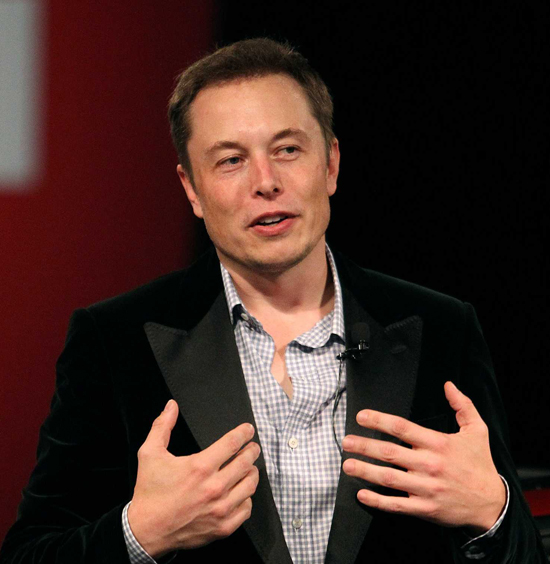A US entrepreneur is revealing one of the many positive sides of curbing emissions [16 June 2015 | Peter Boyer]
The splash of light that Dark Mofo brings to Hobart tells us a lot about ourselves. As much as we need steady, predictable patterns in our lives, there’s nothing like a good surprise.
David Walsh is a surprising person, bless him. So is another gambler, the South African-born, Los Angeles-based entrepreneur Elon Musk.
Musk is especially surprising to me. I confess to a prejudice against the idea that corporate America can save the world. Whatever their “vision”, squillionaires look after themselves, and that includes the bright sparks of Silicon Valley, the Mark Zuckerbergs and Larry Pages.
I’d heard years ago about this particular bright spark, but was disinclined to follow up. It was my view that as a climate fixer, Musk’s technology rated somewhat below political and social matters. But last week, on a friend’s recommendation, I watched a recent presentation by Musk about a new battery system being developed by his electric car company, Tesla.
I expected a slick, breezy show, like the late Steve Jobs selling an iPhone, but in stark contrast to Jobs, Musk comes across as diffident, uncertain, modest; also friendly and funny. He didn’t seem like a person I should take too seriously. Climate is, after all, a serious business.
But his is a truly audacious vision. You got a hint of it in his description of the sun: “this handy fusion reactor in the sky [which] just shows up every day and produces ridiculous amounts of power.” It’s a vision he pursues with determination and resolve.
He already has a formidable record of achievement. As a young physics-economics graduate in California around 2000 he became a multi-millionaire from the sale of financial management systems (including a fledgling PayPal). But Musk had grander dreams.
Like the legendary astronomer Carl Sagan, he combined a fascination with planetary and space physics with a concern for the future of humanity. With Mars settlement in his sights he established a rocket research and manufacturing company called SpaceX. It looked like overreach, but the company has survived early launch failures and the global financial crisis to produce a rocket good enough to win multiple contracts from NASA.
In 2004 Musk founded a car company named after engineer-physicist Nikola Tesla (1856-1943). Honouring Tesla’s innovative spirit, Tesla cars would be powered by electricity only. Musk’s one-finger salute to doubters was to make the company’s first model a high-performance sports car.
Like SpaceX, Tesla Motors has had its times of crisis. With the financial world in near-meltdown in late 2008, US$70 million from Musk’s own pocket was needed to keep the company solvent. It went on to produce its most successful car to date, the family-sized Model S.
With advanced battery technology delivering a range of over 400 km, Model S sales numbers are increasing exponentially year-on-year. Nissan has sold many more of its Leaf electric cars, but that’s a small short-range vehicle with an established manufacturer and dealer network behind it.
Tesla aims to release its large utility vehicle (able to tow caravans) at the end of this year, and to have a mid-sized sedan on the market in 2018 at a price competitive with similar petrol-driven cars.
All very well, but my main interest in watching the Musk presentation was in how Tesla battery technology might be utilised more widely. I wasn’t disappointed.
Tesla has now launched “Powerwall”, a sleek wall-mounted battery for homes that stores energy from the grid or solar panels. That, says Musk, will help to meet power utilities’ need to even out demand.
This is where converging technology streams come into play. In 2006 Musk funded a new company called SolarCity, now one of the top two US rooftop solar power providers, which has given him a foothold in a potentially huge market: large-scale energy storage.
“The obvious problem with solar power,” Musk told his audience last month, “is that the sun does not shine at night…This problem needs to be solved.” So now he’s about to start building a “gigafactory” in Nevada to assemble batteries powerful enough to energise whole cities.
Many questions remain about electric vehicle and energy storage technology, and innovators face stern opposition from the huge array of established businesses threatened with disruption. We don’t know how it will all pan out, but it won’t be boring. That’s life at the cutting edge.
Musk saw long ago the multiple converging roads toward serious advances in curbing emissions. The driver of change is going to be economic disruption. Political action will follow in its wake.
• THE European Union is staging events in seven Australian cities including Hobart as part of a worldwide effort to promote informed debate in the lead-up to this year’s decisive Paris climate summit. Tomorrow from 6 pm at the University of Tasmania’s Aurora Lecture Theatre on Castray Esplanade, a showing of the film The Climate Blueprint will be followed by a public discussion.

